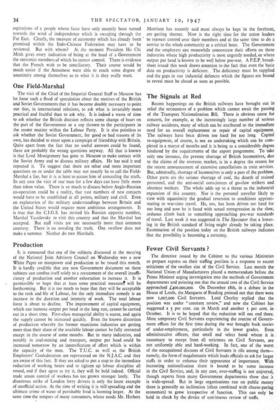The Signals at Red
Recent happenings on the British railways have brought out in relief the seriousness of a problem which cannot await the passing of the Transport Nationalisation Bill. There is obvious cause for concern, for example, at the increasingly large number of serious railway accidents, many of which can be attributed to the immediate need for an overall replacement or repair of capital equipment. The railways have been driven too hard for too long. Capital re-equipment, of course, is not an undertaking which can be com- pleted in a matter of months and it is being to a considerable degree hindered by the requirements of the export programme. To take only one instance, the present shortage of British locomotives, due to the claims of the overseas. market, is in a degree the reason for the recent announcement of extensive cancellations in train services. But, admittedly, shortage of locomotives is only a part of the problem. Other parts are the serious shortage of coal, the dearth of trained personnel, and the anti-social consciences of go-slow strikers and absentee workers. The whole adds up to a threat to the industrial expansion of this country. Nor is the personal traveller likely to view with equanimity the gradual reversion to conditions approxi- mating to war-time travel. He, too, has been driven too hard for too long and now he is faced with actual retrogression in the slow, arduous climb back to something approaching pre-war standards of travel. Last week it was suggested in The Spectator that a lower- ing in the British standard of living might already be taking place. Examination of the position today on the British railways indicates that the possibility is becoming a certainty..


































 Previous page
Previous page